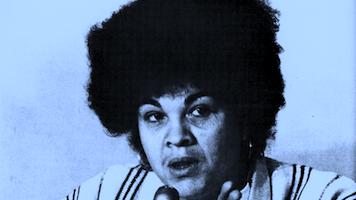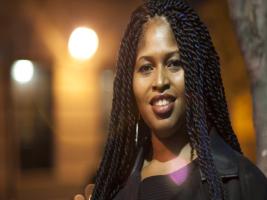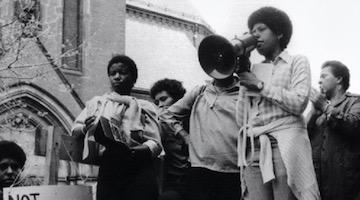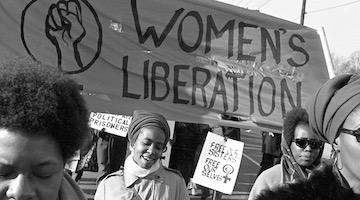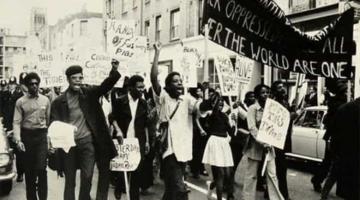Black feminism should be focused on the struggle against colonial structures and not solely on issues of personal empowerment.
Originally published in Hood Communist.
My initial introduction to radical feminist politics was through convoluted, often antagonistic online discourses, where past works of radical feminists are engaged, discussed, and ultimately flattened. Audre Lorde has always been among the most popularly referenced Black feminists cited online, for example, but always for her gender critical analysis (which could be used as fodder in heated discourse) and never for her anti-imperialist analysis. It’s much easier for one to gain attention and retweets through cherrypicking her words on gender and sexuality, but much less popular to dive into her works on the imperialist U.S. invasion of her homeland Grenada whose revolution emphasized the role of women in society, for example. Only through study and organizing did I begin to distinguish between the social media driven “cannon” of Black feminism, and the realized concept of revolutionary feminisms.
Revolutionary African feminism (oftentimes used interchangeably with radical Black feminism) is understood as a feminist ideology that seeks to fundamentally transform and decolonize societal structures, and eliminate all forms of patriarchy and gender-based oppression. Through a material structural analysis, consciousness-raising, and collective action, it emphasizes the need for systemic change by examining the ways that power structures, social institutions, and cultural norms perpetuate gender-based oppression.
Learning of the concept of “two colonialisms” pushed forward as both idea and praxis by the women of the PAIGC (African Party for the Independence of Guinea and Cape Verde) changed how I began to understand an approach to feminism that approached gender equality on the basis of its broader anti-colonial and revolutionary goals. This was not simply the inclusion of women in the protracted armed struggle for independence from Portuguese colonial forces, but a true decolonial process of understanding how colonialism managed to dupe both African men and women, and how intimately linked the struggle against patriarchy was to the struggle against imperialism. African men and women were tied together in a dialectic relationship, which enhanced the need for proper strategy and cooperation among the two. In other words, the revolution in Guinea Bissau required not just an emphasis on developing a new man, but a new woman as well. Their struggle could not afford to be waged on the basis of “men vs. women”, but instead, everyone against the reactionary colonial culture of the past, toward the development of a Revolutionary African Personality. Bissaun revolutionary Teodora Gomes summed it up best when she said “You cannot isolate the liberation of women in circumstances such as ours because there is one goal for our society— which is to transform it step by step.”
However, revolutionary feminist ideals in the West have been largely co-opted and assimilated into mainstream liberal frameworks, losing their transformative potential. Radical liberal (rad-lib) Black feminism has diluted many core principles and objectives of revolutionary feminism, such as notions of bodily autonomy and gender equality. While revolutionary African feminism seeks to challenge and dismantle structural inequities and power dynamics, when it is liberalized, priorities shift to individualistic perspectives and experiences, focusing on personal empowerment rather than addressing broader systemic issues. This shift has undermined the collective action and solidarity necessary for achieving meaningful social change and liberation, effectively de-politicizing a once revolutionary and collective ideology. By emphasizing personal choices and empowerment without critically examining the broader socio-political context, rad-lib Black feminism has diverted attention away from structural inequalities and systemic injustices while convincing millions that their personal experiences are the systemic issues themselves, and therefore that an examination of personal experiences suffices for an analysis of structural issues of capitalism. Moreover, it has shifted discourse away from deep examination of the colonial-capitalist state itself as an entity responsible for perpetuating patriarchy.
This shift and co-optation, of course, can be traced back to the negative impacts neoliberal capitalism has had on African social movements within the U.S in general, but revolutionary feminism, specifically. Neoliberalism’s focus on individual success and self-advancement through engagement in the capitalist market and consumption, centers personal gain over collective liberation, diluting the collective goals and transformative potential of revolutionary African feminism. Neoliberal capitalism exacerbates the oppressive systems that revolutionary feminism seeks to dismantle, including economic exploitation, endless privatization, and state abandonment. At the same time, neoliberal capitalism encourages a class of African women to lean into exclusionary approaches, like failure to consider class, which perpetuates inequalities and reinforces power imbalances. It is important to critically examine and challenge the negative impacts of neoliberal capitalism on revolutionary African feminisms which made this co-option of the ideology possible, seamless even.
While it is true that rad-lib Black feminism overlooks the specific challenges faced within and by colonized communities, it has unfairly been attributed to the framework of ‘intersectionality’. It is important to note that the negative impacts associated with intersectionality do not stem from the framework itself, but rather from misapplications of it as exemplified with the “oppression olympics” style misinterpretation of it. Intersectionality has provided a valuable framework for understanding and addressing systemic discrimination specifically within legal systems, pushing for more inclusive and just legal frameworks and practices, but has somehow also been made a one-size-fits-all framework because it recognizes how different forms of discrimination and oppression intersect and overlap.
As such, the framework has been flattened to mere identity reductionism, the essentializing of identities, which reduces individuals to a set of fixed characteristics or experiences. By reducing identities to a singular focus, such as gender alone, rad-lib Black feminism has failed to fully address the unique struggles and experiences of colonized women. Additionally, without the clarity and larger context of being situated within a revolutionary ideology, rad-lib feminism often weaponizes the framework of intersectionality to uncritically engage in gender-essentialism.
Furthermore, in the midst of neoliberal austerity policies, which African women bear the brunt of due to privatization and reduced investments in public services and social safety nets, rad-lib feminism has proven wholly inadequate. The systemic barriers, upheld by neoliberalism, undermine the goals of revolutionary African feminisms by hindering efforts to address the root causes of structural inequalities that impact the lives of African women. Rad-lib Black feminism has become increasingly regressive, inadvertently focusing narrowly on notions of sexual liberation, the “girl boss”, etc., and not anything that would shift the material conditions of African working women (i.e. access to healthcare, education, affordable housing, and social safety nets).
Rad-lib Black feminism has defanged a principled movement of revolutionary African feminisms by co-opting the language and militant imagery of individuals like Assata Shakur, while ignoring their larger objectives. This is made abundantly clear when observing the practices of decolonial feminisms across the Third World inspired by the practices of Revolutionary African feminisms. The Fundación Entre Mujeres (FEM) in Esteli, Nicaragua explores the relationship between feminism and agroecology, women, and seeds to develop a specific bottom-up approach to empower women of the peasant class as Campinsinas Feministas (distinct from working class). Inspired by the revolutionary decolonial feminism practiced on the continent (like with the women of the PAIGC), the FEM places an emphasis on what they understand to be “Managua feminism” (mainstream rad-lib) vs the feminism that they practice. The women are clear about the radical alteration of power relations necessary, promoting the articulation of women in the community through local committees and agroecological networks, communication, community, and environmental defenders.
In an interview with Stephanie Urdang, author of the book Fighting Two Colonialisms, Teodora Gomes says:
“The struggle for the liberation of women has to be done in different ways. First of all, women must fight together with men against colonialism and all systems of exploitation. Secondly, and this is one of the most fundamental points, every woman must convince herself that she can be free and that she has to be free. And that she is able to do all things that men do in social and political life. And thirdly, women must fight in order to convince men that she has naturally the same rights as he has. But she must understand that the fundamental problem is not the contradiction between women and men, but it is the system in which we are all living.”
Taking on labels like ‘feminism’ is not a matter of rigidity, but clarity. Radical ideology requires challenging and transforming structures of power that perpetuate inequality, including colonial legacies and imperialist practices. How we identify politically is meant to provide important insights and tools for understanding and addressing the complex, intersecting forms of oppression that impact African women and all colonized people.
Erica Caines is a poet, writer and organizer in Baltimore and the DMV. She is an organizing committee member of the anti war coalition, the Black Alliance For Peace as well as an outreach member of the Black centered Ujima People’s Progress Party. Caines founded Liberation Through Reading in 2017 as a way to provide Black children with books that represent them and created the extension, a book club entitled Liberation Through Reading BC, to strengthen political education online and in our communities.

